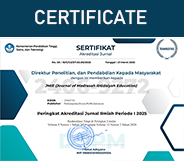RELATIONSHIP BETWEEN ATTITUDE TOWARD STEM AND COMPUTATIONAL THINKING ABILITY IN MATHEMATICS LEARNING OF ELEMENTARY SCHOOL STUDENTS
Abstract
Keywords
Full Text:
PDFReferences
Astri, H., Sinurat, Y., & Muhammad, D. (2022). The Implementation of Integrated Project-Based Learning Science Technology Engineering Mathematics on Creative Thinking Skills and Student Cognitive Learning Outcomes in Dynamic Fluid. 8(1), 8394.
Bakala, E., Gerosa, A., Hourcade, J. P., & Tejera, G. (2021). Preschool children, robots, and computational thinking: A systematic review. International Journal of Child-Computer Interaction, 29, 100337.
Baran, E., Bilici, S. C., Mesutoglu, C., & Ocak, C. (2019). The impact of an out?of?school STEM education program on students attitudes toward STEM and STEM careers. School Science and Mathematics, 119(4), 223235.
Cansu, F. K., & Cansu, S. K. (2019). An Overview of Computational Thinking. International Journal of Computer Science Education in Schools, 3(1), 1730.
Ching, Y., Wang, S., & Swanson, S. (2019). Elementary School Student Development of STEM Attitudes and Perceived Learning in a STEM Integrated Robotics Curriculum.
Citt, G., Gentile, M., Allegra, M., Arrigo, M., Conti, D., Ottaviano, S., Reale, F., & Sciortino, M. (2019). Computers & Education The e ff ects of mental rotation on computational thinking. 141(January).
Creswell, J. W. (2014). Research Design. Pustaka Pelajar.
Ezeamuzie, N. O., & Leung, J. S. C. (2022). Computational Thinking Through an Empirical Lens: A Systematic Review of Literature. Journal of Educational Computing Research, 60(2), 481511.
Fidai, A., Capraro, M. M., & Capraro, R. M. (2020). Scratch -ing computational thinking with Arduino : A. Thinking Skills and Creativity, 38(September), 100726.
Grover, S., & Pea, R. (2013). Computational Thinking in K-12: A Review of the State of the Field. Educational Researcher, 42(1), 3843.
Jeannette M. Wing LISA. (2018). Computational Thinking. Studies in Computational Intelligence, 727, 135160.
Kafai, Y. B., & Proctor, C. (2022). A Revaluation of Computational Thinking in K12 Education: Moving Toward Computational Literacies. Educational Researcher, 51(2), 146151.
Kafai, Y., Proctor, C., & Lui, D. (2020). From theory bias to theory dialogue: Embracing cognitive, situated, and critical framings of computational thinking in K-12 Cs education. ACM Inroads, 11(1), 4453.
Kayan-Fadlelmula, F., Sellami, A., Abdelkader, N., & Umer, S. (2022). A systematic review of STEM education research in the GCC countries: trends, gaps and barriers. International Journal of STEM Education, 9(1).
Kemendikbudristek. (2020). Keterampilan 5C Penting untuk Masa Depan. Kementerian Pendidikan, Kebudayaan, Riset, Dan Teknologi.
Khan A, S., Shah, A., Makhdoom, S., Mahmood, Z., & Zareen, R. (2012). Scientific Attitude Development at Secondary School Level: A Comparison between Methods of Teaching. Language in India, 12(9), 439454.
Kong, S.-C., Abelson, H., & Kwok, W.-Y. (2022). Introduction to Computational Thinking Education in K12. In Computational Thinking Education in K12.
Lee, I., & Malyn-Smith, J. (2020). Computational Thinking Integration Patterns Along the Framework Defining Computational Thinking from a Disciplinary Perspective. Journal of Science Education and Technology, 29(1), 918.
Li, Y., Schoenfeld, A. H., diSessa, A. A., Graesser, A. C., Benson, L. C., English, L. D., & Duschl, R. A. (2020a). Computational Thinking Is More about Thinking than Computing. Journal for STEM Education Research, 3(1), 118.
Li, Y., Schoenfeld, A. H., diSessa, A. A., Graesser, A. C., Benson, L. C., English, L. D., & Duschl, R. A. (2020b). On Computational Thinking and STEM Education. Journal for STEM Education Research, 3(2), 147166.
Lin, K., Hsiao, H., Williams, P. J., Chen, Y., Hsiao, H., Williams, P. J., & Chen, Y. (2019). Effects of 6E-oriented STEM practical activities in cultivating middle school students attitudes toward technology and technological inquiry ability. Research in Science & Technological Education, 00(00), 118.
Lodi, M., & Martini, S. (2021). Computational Thinking, Between Papert and Wing. Science and Education, 30(4), 883908.
Maharani, A. (2020). Computational Thinking dalam Pembelajaran Matematika Menghadapi Era Society 5.0. Euclid, 7(2), 86.
Nouri, J., Zhang, L., Mannila, L., & Norn, E. (2020). Development of computational thinking , digital competence and 21 century skills when learning programming in K-9. Education Inquiry, 11(1), 117.
Paramita, I., Gustina, & Laratu, W. (2021). Pengembangan Bahan Ajar Digital Berbasis Stem Untuk Meningkatkan Kemampuan Berpikir Kritis Mahasiswa Pada Materi Fisika Instrumentasi. Jurnal Pendidikan Fisika Tadulako Online, 9(August), 17.
Selby, C. (2013). Computational Thinking : The Developing Definition. ITiCSE Conference 2013, 58.
Shahin, M., Ilic, O., Gonsalvez, C., & Whittle, J. (2021). The impact of a STEM-based entrepreneurship program on the entrepreneurial intention of secondary school female students. International Entrepreneurship and Management Journal, 17(4), 18671898.
Shin, N., Bowers, J., Roderick, S., & Mcintyre, C. (2022). A framework for supporting systems thinking and computational thinking through constructing models. 933960.
Tang, X., Yin, Y., Lin, Q., Hadad, R., & Zhai, X. (2020). Assessing computational thinking: A systematic review of empirical studies. Computers and Education, 148(December 2019), 103798.
Thahir. (2020). The Effectiveness of STEM Learning : Scientific Attitudes and Students Conceptual Understanding The Effectiveness of STEM Learning : Scientific Attitudes and Students Conceptual Understanding.
Tsai, M. J., Liang, J. C., & Hsu, C. Y. (2021). The Computational Thinking Scale for Computer Literacy Education. Journal of Educational Computing Research, 59(4), 579602.
Wieselmann, J. R., Roehrig, G. H., & Kim, J. N. (2020). Who succeeds in STEM ? Elementary girls attitudes and beliefs about self and STEM. February, 297308.
DOI: http://dx.doi.org/10.32934/jmie.v7i2.581
Refbacks
- There are currently no refbacks.

This work is licensed under a Creative Commons Attribution 4.0 International License.
Copyright © 2017, JMIE: Journal of Madrasah Ibtidaiyah Education, p-ISSN: 2580-0868, e-ISSN: 2580-2739
Indexed By:





